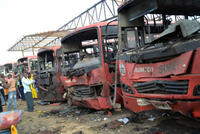-
DHS cancels acquisition of BioWatch’s Generation 3 technology
Owing to concerns about BioWatcheffectiveness and high cost, DHS has canceled plans to install an automated technology meant to speed the 24-hour operations of the program, the nation’s system for detecting a biological attack.ASeptember 2012 GAO report estimated that annual costs to operate the Generation 3 technology would be “about four times more” than the existing BioWatch system.
-
-
More crude oil shipments by rail mean more accidents, but security measures lag

American rail companies have long operated under federal laws, making it difficult for local officials to gather information on cargo and how rail companies select their routes. An increase in the number of trains transporting crude oil, accompanied by a series of derailments and explosions, has highlighted the dangers of transporting hazardous substances by rail.In February, the Department of Transportation announced that railroads had voluntarily agreed to apply the same routing rules to oil trains that they currently apply to other hazardous materials. Critics say more needs to be done.
-
-
U.S. approves fewer security clearances
A new report by the Office of the Director of National Intelligence(ODNI) shows that the number of new security clearances provided by the federal government, both initial clearances and renewals, has decreased by 9 percent since 2011. The number of approved clearances decreased for the second consecutive year in fiscal 2013, to just over 777,000.One observer saidthe reduction is a response to a period in the mid-2000s when “basically everyone needed a clearance.”
-
-
Terrorism can be a successful strategy, but only when governments allow it to work
Terrorism can be a successful strategy for rebel groups during civil war, but only when governments allow it to work, finds a new study. Responding to acts of terrorism with violence is more likely to prolong the conflict. If governments negotiate or use sound counterterrorism efforts, however, they stand a better chance of bringing about a peaceful resolution. The study analyzed civil conflict from 1989 to 2010 in Africa, which has seen a drastic rise in terrorism. Some forty-five of the 106 African rebel groups in the study carried out terrorist attacks.
-
-
Former DHS IG altered oversight reports, shared information
Charles Edwards, the acting DHS inspector general from 2011 through 2013, has been found to have routinely shared insider information with other department leaders, according to a new report from a the Homeland Security and Government Operations Committee published last week.
-
-
Al-Qaeda tried to turn an Oregon ranch into a training camp

U.S.-born Muslim convert Eva Hatley testified in Manhattan federal court on Tuesday, claiming that after opening her family’s Oregon ranch to local Muslims to teach them how to grow and can vegetables, the men turned her home into an al-Qaeda training camp. She said “carloads” of fellow Muslims she met through her mosque arrived at her 160-acre ranch in Bly in 1999.Hatley was testifying at the trial of Abu Hamza al-Masri.
-
-
Access of Russian surveillance craft to U.S. airspace questioned
Under the Treaty on Open Skies (OS), signed in 1992 and ratified in 2002, thirty-four nations allow the protected passage over their territory of surveillance aircraft from other OS signatory member states, aircraft featuring advanced sensory equipment that allow for the monitoring of arms controls compliance and troop movements. With rising U.S.-Russia tensions over Ukraine, and with information emerging about a new Russian surveillance aircraft model equipped with the most advanced surveillance capabilities, U.S. government officials and lawmakers question whether OS-related Russian surveillance flights over the United States should continue.
-
-
Vermont mandates labeling of foods containing GMOs
On Wednesday, legislators in Vermont passed a billrequiring the labeling of foods which contain genetically modified organisms (GMOs), making the state the first in the United States to pass such a law without contingencies. Proponents of the law, and of similar attempts across the country, hailed the legislative approval as a victory. About twenty other states have pending measures regarding labeling GMO-based foods, but the biotech and food industries have been lobbyingfederal legislators to prevent such measures.
-
-
Businesses looking to bolster cybersecurity
Since the recent data breaches at retailers Target and Neiman Marcus, in which hackers stole millions of customers’ credit and debit card information, consumers have been urging card providers to offer better secure payment processors. Legislators have introduced the Data Security Act of 2014 to establish uniform requirements for businesses to protect and secure consumers’ electronic data. The bill will replace the many different, and often conflicting, state laws that govern data security and notification standards in the event of a data breach.
-
-
Al Qaeda's chief bomb maker killed in U.S.-backed attack in Yemen

Ibrahim al-Asiri, 32, al-Qaeda’s chief bomb-maker, is said to have been killed in a U.S.-supported, 2-day attack on al-Qaeda operation base in south Yemen on Sunday and Monday. The attack on the base included ground attacks by Yemeni special forces ferried to the theater in Russian-made helicopters piloted by U.S. Special Forces pilots, and drone strikes. Yemeni special forces, using intelligence provided by the United States, set up an ambush for al-Asiri and opened fire on a 4x4 vehicle believed to be carrying him. Samples were taken from the body believed to be that of al-Asiri, and DNA tests are now being conducted.
-
-
Public safety officials implement Boston bombing's lessons
The use of improvised tourniquets to stop bleeding was considered not only old-fashioned, but potentially damaging. Yet, in the minutes following the Boston marathon bombing, people near the finish line used improvised tourniquets to stop the bleeding of dozens of those injured around them while waiting for medical crews to arrive. Security and public safety officials have used lessons learned from the 2013 Boston Marathon bombing to prepare for this year’s event, including providing police officers with tourniquets. Organizers of large public events are implementing other lessons from the 2013 attack.
-
-
Boston bombing spurred small, midsize businesses to buy terrorism insurance
After the 2013 Boston Marathon bombing, terrorism insurance, designed for large businesses, became a necessary business expense for many midsize and small firms. Some 160 companies near the Boston explosion submitted insurance claims for property damage or business losses and only 14 percent had coverage for terrorism. “The Marathon attack changed the calculus,” an insurance industry insider says. “It taught us terrorism is a risk to businesses of every scale and size.”
-
-
The Nigerian bus terminal attack: Public transport is a lucrative terror target

During the morning rush hour on 14 April, a car bomb containing an estimated 500-800 pounds of explosives blew up at the Nyanya District bus station on the outskirts of Abuja, Nigeria. Terrorism experts from the Mineta Transportation Institute (MTI) say we should note the significance of the attack for the rest of the world and put the facts into a larger perspective. Looking at all attacks on public surface transportation systems worldwide since 1970, the Abuja bombing was the twelfth most lethal attack. When comparing similar attack methods, it was the ninth most lethal attack.
-
-
U.S. drone attacks kill at least 55 al-Qaeda militants in Yemen
A series of U.S. drone strikes Sunday and Monday killed at least fifty-five al-Qaeda militants in Yemen. The operation focused on al-Qaeda operation basecamps in the rugged mountain of the central and southern provinces of Yemen. Yemeni government sources to say that the first series of attacks, carried out on Sunday, killed three prominent al-Qaeda operatives. Al-Qaeda made gains in Yemen during the chaos which accompanied the 2011 popular uprising against then-President Ali Abdullah Saleh, who was driven from power a year later. In the last two years, the United States and the new Yemeni government have escalated the fight against the Islamist militants.
-
-
Adoption of battlefield surveillance system in urban settings raises privacy concerns
More cities are adopting an aerial surveillance system first developed for the military. The surveillance cameras, fitted on a small plane, can record a 25-square-mile area for up to six hours, and cost less than the price of a police helicopter. The system also has the capability of watching 10,000 times the area that a police helicopter could watch. Privacy advocates are concerned. “There are an infinite number of surveillance technologies that would help solve crimes, but there are reasons that we don’t do those things, or shouldn’t be doing those things,” said one of them.
-
More headlines
The long view
Factories First: Winning the Drone War Before It Starts
Wars are won by factories before they are won on the battlefield,Martin C. Feldmann writes, noting that the United States lacks the manufacturing depth for the coming drone age. Rectifying this situation “will take far more than procurement tweaks,” Feldmann writes. “It demands a national-level, wartime-scale industrial mobilization.”
No Nation Is an Island: The Dangers of Modern U.S. Isolationism
The resurgence of isolationist sentiment in American politics is understandable but misguided. While the desire to refocus on domestic renewal is justified, retreating from the world will not bring the security, prosperity, or sovereignty that its proponents promise. On the contrary, it invites instability, diminishes U.S. influence, and erodes the democratic order the U.S. helped forge.
Fragmented by Design: USAID’s Dismantling and the Future of American Foreign Aid
The Trump administration launched an aggressive restructuring of U.S. foreign aid, effectively dismantling the United States Agency for International Development (USAID). The humanitarian and geopolitical fallout of the demise of USAID includes shuttered clinics, destroyed food aid, and China’s growing influence in the global south. This new era of American soft power will determine how, and whether, the U.S. continues to lead in global development.
Water Wars: A Historic Agreement Between Mexico and US Is Ramping Up Border Tension
As climate change drives rising temperatures and changes in rainfall, Mexico and the US are in the middle of a conflict over water, putting an additional strain on their relationship. Partly due to constant droughts, Mexico has struggled to maintain its water deliveries for much of the last 25 years, deliveries to which it is obligated by a 1944 water-sharing agreement between the two countries.
How Disastrous Was the Trump-Putin Meeting?
In Alaska, Trump got played by Putin. Therefore, Steven Pifer writes, the European leaders and Zelensky have to “diplomatically offer suggestions to walk Trump back from a position that he does not appear to understand would be bad for Ukraine, bad for Europe, and bad for American interests. And they have to do so without setting off an explosion that could disrupt U.S.-Ukrainian and U.S.-European relations—all to the delight of Putin and the Kremlin.”
How Male Grievance Fuels Radicalization and Extremist Violence
Social extremism is evolving in reach and form. While traditional racial supremacy ideologies remain, contemporary movements are now often fueled by something more personal and emotionally resonant: male grievance.
